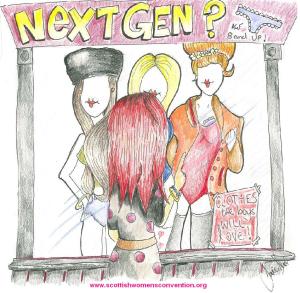by Paula Dunn, Glasgow Rape Crisis 
Coping with Sexual Violence at School
The Rosey Project, the prevention project at Glasgow Rape Crisis, has been supporting young women between the ages of 13 – 17 since 2005. During this time we have helped young women who have raped or sexually assaulted by a boy they go to school with. On some occasions the rape has taken place inside the school. A news article in October 2014 reported police statistics 2011 – 2013, revealing that 328 sexual offences took place in Scottish schools, 48 of these offences being rape.
At the Rosey Project, we’re unfortunately not surprised by these figures. What we are concerned about is how schools deal with this issue. As I have said, we have supported young women who have been raped in their school. Recently we also helped a young woman who had been raped outside of school by a peer. It does not matter where the rape has taken place. The devastating impact it has on her life and education is the same.
In our experience teachers are not trained or equipped to deal with disclosures of rape. In cases where the perpetrator is also a pupil at their school they seem to have even less confidence in properly dealing with the issue.
As you might imagine when a young woman is raped by a peer at her school she will become anxious and sometimes isolated. Often the perpetrator continues to bully the victim in order to silence her or provoke her in to being violent to try and convince people ‘she is crazy’. We have dealt with cases like this where a victim has been further exposed to risk as she is bullied by the perpetrator or his friends. The teacher’s response is often to tell the young woman to just walk away. This is easier said than done when you’re trapped in a corner by a group of angry young men.
We have worked with a young woman who, whilst defending herself against a physical assault by the perpetrator and his friends, was disciplined for hitting him and threatened with expulsion. The teacher’s response when I queried this was that they cannot tolerate any violent behaviour. The young woman should have walked away and told a teacher. This is a completely inappropriate response. There is a lack of training and understanding about the impact of sexual violence and this needs to be addressed to help young women.
We try and work closely with teachers if we are supporting a young woman at school. Glasgow Rape Crisis understands that the teacher’s job is to achieve academic results but it is also their job to ensure that all pupils feel safe and supported. Any issues that might affect this and their mental health should be managed and dealt with appropriately.
We offer training for teachers to help them deal better with disclosures and hopefully in the future, young women will feel supported in raising issues of sexual violence and assaults in the school environment.


